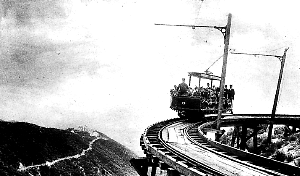of British Electric
Tramways
E. Jackson-Stevens
(David & Charles)

England, like the U. S., may be a socialistic country --- socialism for the rich, that is --- but it has been wise enough to keep public transportation decisions out of the hands of the corporate huns, so their tramways survived another two or three decades, and even to this date they have a fine rail system which includes trollies in Manx, Blackpool, and Snaefell Mountain. Did you say Snaefell Mountain?
These historical photographs should be enough to pull at your heartstrings, especially the double-deckers (some with open tops), and the bogie cars with glazed windows.
Jackson-Stevens claims the first tramway was built in 1776 --- of cast-iron, with L plates for the wheels. He quotes approvingly from Lord Macaulay who said
- those inventions which abridge distance have done most for the civilization of our species
Sojourns with People
of the Outer Hebrides, the
Sierra Madre, the Himalayas,
and Other Remote Places
Ethan Hubbard
(Chelsea Green)
If you ever entertained thoughts that the photograph is non-judgmental --- free of editorializing --- let this volume be a lesson to you. Never has there been a more complete collection of happy, smiling, friendly, laughing, winsome, thoughtful, strong-backed natives: not a booger or egg-eye in the bunch.
We don't want petulant honesty to get in the way of good photojournalism, but it does get a bit cloying --- and the text echoes a world of laughing, funny, wondrous, wise, child-delighting denizens of the world. (We have yet to travel to a place like Guatemala, Chad, or India where the poverty didn't stink and the desperation of the poor didn't tear your heart out --- but maybe Hubbard has some Magic Visit Powder we never heard of to make his journeys all perfect.) He chances on his mother in San Miguel de Allende, and bless me if she isn't "white-haired, kindfaced" just like everyone else.
for Elija
by Menke Katz
(The Smith)
- Moses
the rock which
you hurt in the
wilderness will not
forgive you, will call you
to justice on the day when
Messiah will come to proclaim
the end of death (O then only death
will die) 0 see the rock every sundown
as your own wound which even God cannot heal.
of Classic
Southern
Humor, II
George W. Koon, Editor
(Peachtree)
Walker Percy is included in this collection, but the day that Mr. Existential Glum writes something funny is a day we want to see, and expecting Eudora Welty to make us chuckle is like searching for a yuck in the works of John Milton.
Augustus Baldwin Longstreet (1790 - 1870) "...dod drot my soul if he eint..." might be historical but is hardly hysterical. Faulkner's entry from The Hamlet is choice, not for risibility, but for the usual genius. His character has
- the face of the breathing archetype and protagonist of all men who marry young and father only daughters and are themselves but the eldest daughter of their own wives...
We'd like to lock Koons in a room full of the works of Benchley, Jerome K. Jerome, and Perelman for a week to try to rouse him from his editorial dum-dums.
Empire
Brian Lapping
(St. Martins)
End of Empire, which came out of the television series on Granada Television, in England, is the best substitute for a lousy education we could imagine. Ten British colonies are dealt with --- their history, their independence, their present and future --- described with care and good writing.
The heroes and villains in all this are surprising. One that Lapping detests most of all is Winston Churchill, whose opposition to the coming of home rule in India fomented the disaster of 1947 --- where the creation of Pakistan also created horrific bloodshed. The reason: Churchill's delaying tactics with India had
- enormous effect. If a representative government of Indians had been formed before the war, or in 1940, or in 1942...Congress and the Muslim League could have exercised power for a useful period before the final transfer.
Shadows of
the New World
Ved Mehta
(Norton)
This is chronicle of his life at the Arkansas School for the Blind forty-five years ago; and if you think you have culture shock when you go to, say, Cleveland --- imagine what it would be like journeying from the Hindu town of Simi, India, to Little Rock in 1949. Mehta is a careful reporter --- and the description of the mix of problems of the adolescent, and the problems of the blind adolescent, and the problems of the blind adolescent in Arkansas, and the problems of the blind Indian adolescent in Arkansas during times of segregation: why, they're acute and gripping.
This may be Mehta's best book, giving a rich you-are-there feeling: getting a job in an ice cream factory; negotiating the streetcars of Little Rock; dealing with the moral dilemma how to go out on a date --- since dating isn't in the Hindu vocabulary.
A New Anatony of
The Great Foundations
Waldemar Nielsen
(Dutton)
For example, W. L. Moody was
- one of the most mean-spirited, compulsively acquisitive, and generally unattractive tycoons in the history of American capitalism
More fascinating, and more depressing, is the Lloyd Noble Foundation. Noble was concerned about mid-west agriculture, what poor farming techniques were doing to the land, and to the poverty-stricken farmers --- and resolved that his foundation would do research to help them. After his death, however, the board veered sharply away from his humanitarian concerns, so that recent grants have gone mainly to national retardee organizations such as the Committee on Present Danger, the Heritage Foundation, and the National Strategy Information Center.
Price Guide To
Non-Paper Sports
Collectibles
Ted Hake and
Roger Steckler
(Hake's Press)
- First Base: I am at the bat for the Dispatch & Pioneer Press.